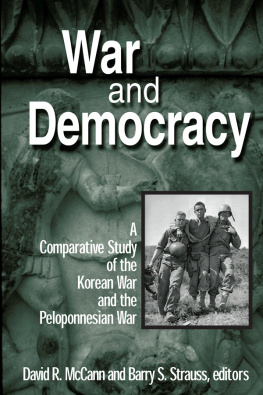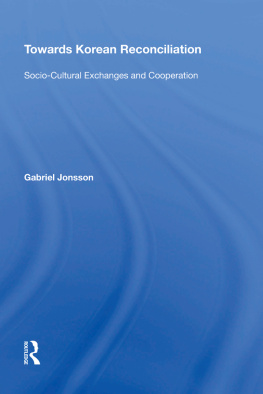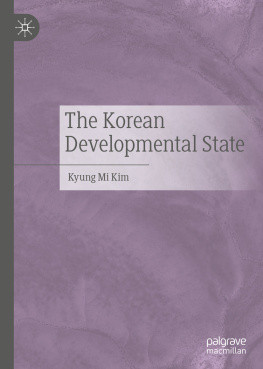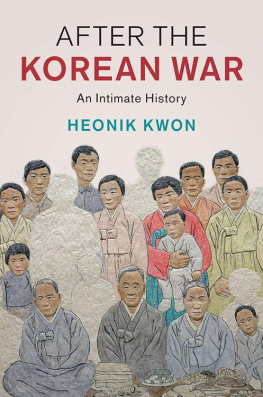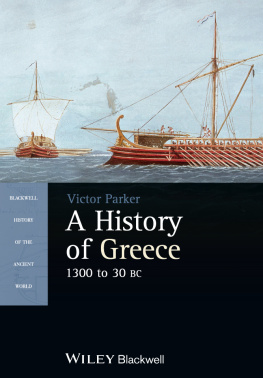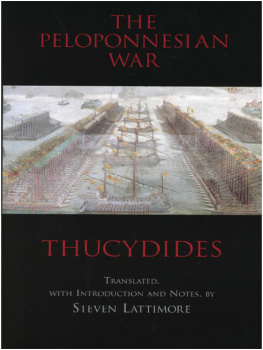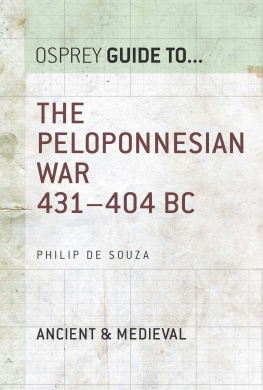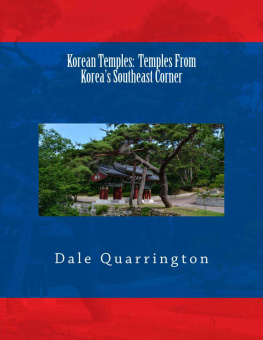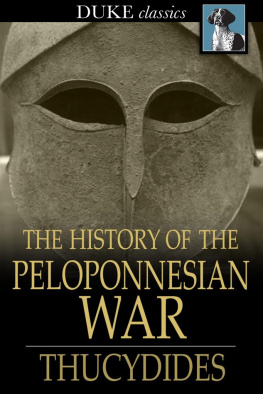War
and
Democracy
The editors and publisher of this volume gratefully acknowledge the generous support of the Korea Foundation. The opinions, findings, and conclusions or recommendations expressed in this publication are those of the authors and do not necessarily reflect the views of the Korea Foundation.
War
and
Democracy
A
Comparative Study
of the
Korean War
and the
Peloponnesian War
David McCann and Barry S. Strauss
editors
First published 2001 by M.E. Sharpe
Published 2015 by Routledge
2 Park Square, Milton Park, Abingdon, Oxon OX14 4RN
711 Third Avenue, New York, NY, 10017, USA
Routledge is an imprint of the Taylor & Francis Group, an informa business
Copyright 2001, Taylor & Francis. All rights reserved.
No part of this book may be reprinted or reproduced or utilised in any form or by any electronic, mechanical, or other means, now known or hereafter invented, including photocopying and recording, or in any information storage or retrieval system, without permission in writing from the publishers.
Notices
No responsibility is assumed by the publisher for any injury and/or damage to persons or property as a matter of products liability, negligence or otherwise, or from any use of operation of any methods, products, instructions or ideas contained in the material herein.
Practitioners and researchers must always rely on their own experience and knowledge in evaluating and using any information, methods, compounds, or experiments described herein. In using such information or methods they should be mindful of their own safety and the safety of others, including parties for whom they have a professional responsibility.
Product or corporate names may be trademarks or registered trademarks, and are used only for identification and explanation without intent to infringe.
Library of Congress Cataloging-in-Publication Data
War and democracy : a comparative study of the Korean War and the Peloponnesian War / David R. McCann and Barry S. Strauss, eds.
p. cm.
Includes bibliographical references and index.
ISBN 0-7656-0694-1 (alk. paper)ISBN 0-7656-0695-X (pbk. : alk. paper)
1. Korean War, 1950-1953. 2. GreeceHistoryPeloponnesian War, 431-404 B.C. 3. Democracy. I. McCann, David R. (David Richard), 1944- II. Strauss, Barry S.
DS918 .W37 2000
ISBN 13: 9780765606952 (pbk)
ISBN 13: 9780765606945 (hbk)
To Sang-duk Yu, former vice president of the Korean Teachers Union, for his dedication to the humane human spirit
D. R.M.
To Donald Kagan, teacher and friend
B.S.S.
Contents
David R. McCann and Barry S. Strauss
Victor D. Hanson
Ronald Steel
Robert Kagan
When Sparta Is Sparta but Athens Isnt Athens:
Democracy and the Korean War
Bruce Cumings
Kathryn Weathersby
Paul Cartledge
Gregory Crane
Dae-Sook Suh
Kongdan Oh
Ellen Schrecker
Stephen J. Whitfield
Jennifer T. Roberts
Thucydides Theoretikos/Thucydides Histor:
Realist Theory and the Challenge of History
Josiah Ober
Kurt A. Raaflaub
Dong-Wook Shin
Barry S. Strauss and David R. McCann
David R. McCann and Barry S. Strauss
At first glance it seems odd to compare the Peloponnesian War and the Korean War. One conflict was ancient, one modern; one took place among city-states and empires; the other, among modern nation-states; one was fought with pre-industrial technology, the other included both human waves of soldiers and the most modern weapons of war; one was fought in the Mediterranean, the other the Pacific. The Peloponnesian War lasted twenty-seven years, from 431 to 404 B.C.; the Korean War lasted only three years, from 1950 to 1953.1 The Peloponnesian War is part of Western civilization, while the Korean War is both a war in Asia and also a chapter in the history of East-West encounters. The Peloponnesian War is a famous conflict, perhaps one of the most carefully studied wars in military history. The Korean War is a historical orphan: Americans call it the forgotten war; Koreans remember it but until recently have hedged it with taboos and censorship; China still refers to its troops as volunteers; finally, although the archives have begun to open since 1989, scholars remain hampered by the large number of documents that still remain secret.
Opposites attract; such contrasts themselves can stimulate new approaches to each of the case studies. It was, however, the similarities between the two cases that first led us to the project.
The geographical similarities first, if superficial, are striking. Both Greece and Korea are peninsulas, rugged, mountainous, and surrounded by thousands of islands and islets. Korea (North and South) is about 85,000 square miles in size, Greece (the modern state) about 50,000 square miles. Each sits at roughly the same latitude, each bisected by the thirty-eighth parallel, which runs not only just north of Seoul but also through Athens. Each provides challenging terrain for agriculture, but in each country at the time of the war in question, most of the population eked out a living from the soil.
Other similarities are less superficial. Both wars were phases in a longer conflict whose main feature was an ideological divide between an open societya democracy and its alliesand a closed societySpartas garrison state in the one case, and communism in the other. For the United States, the Korean War was a brief but violent episode in the Forty Years Warthe Cold War that stretched from the Truman Doctrine of 1947 to the fall of the Berlin Wall in 1989. For Korea the war of 19501953 was a similarly brief, violent conflict within a sequence of struggles that had begun in 1947, the roots of which can be traced back to the Tonghak uprisings of the nineteenth century. The Peloponnesian War was also an episode in the longer Atheno-Spartan conflict from 460 to 371.2 Both wars were turning points. The Peloponnesian War ended Athens empire, brought Sparta to the peak of power in the Aegean, and allowed Persia to re-enter Greek interstate affairs, after having been evicted by a united Greece three generations previously. Unlike the Peloponnesian War, the Korean conflict, as many called it, was a limited wara mere police action, in Trumans phrase. Yet few actions in the history of the Cold War proved more decisive. As a result of the Korean War the United States rearmed to fight the USSR by tripling its military budget and doubling its troops in NATO. A rift between the United States and China was in place for the next twenty years. Meanwhile, the Chinese-Soviet alliance was strengthened, and the United States committed itself to the defense of Taiwan.3
Both wars are case studies in unpredictability. In 431 B.C. Athens leading statesman, Pericles, seems not to have expected a long war, let alone one that would witness a massive epidemic, the reintroduction of Persian power into the Aegean, and the transformation of Sparta into a naval power that matched and ultimately beat the greatest sea power in Greek history, Athens. It would take Thucydides himself to do justice to the twists and turns of policy during the Korean War. The American side of the story alonefrom the apparent public abandonment of South Korea in January 1950 to the attempt to conquer even North Korea just ten months lateris a tale of miscalculations, reversals of fortune, cliff-hangers, tragedies, heroism, massacres. No wonder that General Omar Bradley famously warned that Americas involvement in Korea ran the risk of turning into the wrong war, in the wrong place, at the wrong time, and with the wrong enemy.4

